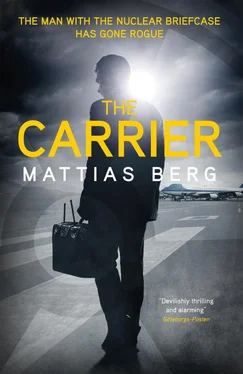Mattias Berg - The Carrier
Здесь есть возможность читать онлайн «Mattias Berg - The Carrier» весь текст электронной книги совершенно бесплатно (целиком полную версию без сокращений). В некоторых случаях можно слушать аудио, скачать через торрент в формате fb2 и присутствует краткое содержание. Город: London, Год выпуска: 2019, ISBN: 2019, Издательство: MacLehose Press, Жанр: Триллер, на английском языке. Описание произведения, (предисловие) а так же отзывы посетителей доступны на портале библиотеки ЛибКат.
- Название:The Carrier
- Автор:
- Издательство:MacLehose Press
- Жанр:
- Год:2019
- Город:London
- ISBN:978-0-85705-788-4
- Рейтинг книги:4 / 5. Голосов: 1
-
Избранное:Добавить в избранное
- Отзывы:
-
Ваша оценка:
- 80
- 1
- 2
- 3
- 4
- 5
The Carrier: краткое содержание, описание и аннотация
Предлагаем к чтению аннотацию, описание, краткое содержание или предисловие (зависит от того, что написал сам автор книги «The Carrier»). Если вы не нашли необходимую информацию о книге — напишите в комментариях, мы постараемся отыскать её.
The Carrier — читать онлайн бесплатно полную книгу (весь текст) целиком
Ниже представлен текст книги, разбитый по страницам. Система сохранения места последней прочитанной страницы, позволяет с удобством читать онлайн бесплатно книгу «The Carrier», без необходимости каждый раз заново искать на чём Вы остановились. Поставьте закладку, и сможете в любой момент перейти на страницу, на которой закончили чтение.
Интервал:
Закладка:
With the help of their different costumes, they could also bring together the conflicting objectives of the protesters in a lighthearted way: they attracted attention as well as offering camouflage. The way in which the activists dressed up had also developed in international demonstrations in recent years. Become a sort of pacifist haute couture , some kind of arms race of love. And here in Sicily the costumes really seemed to have become one with the age-old carnival traditions of the island.
After the sun had come up at 06.41, and dawn began to draw out the colors of the activists, Ingrid and I could just tick off the standing figures. All these complex anti-heroes borrowed from the dramas of antiquity. Ten or so Lysistratas and as many again Medeas. And in addition the authentic heroes: Mahatma Gandhi, Alva Myrdal, Eleanor Roosevelt, any number of each of them. Edelweiss had assured us that this too was a part of the activists’ cold-blooded strategy. That a large number of entirely disparate individuals, ranging from real idealists to genuine terrorists, could wear exactly the same outfits. So that the powers-that-be should never know who lay behind which disguise.
Here too as at Kleine Brogel there were a number of examples of what he had, during his presentations on the threats posed by peace demonstrations, called the Love Dress. Pink wigs and glitter on cheeks, piercings everywhere, grotesquely large lips and breasts, false penises, much naked flesh on both women and men.
On top of that, figures out of the Bhagavad Gita . Often extreme allusions to what Robert Oppenheimer, with his interest in religions, is said to have thought during the first test of an atomic bomb in the New Mexico desert on July 16, 1945—code-named Trinity, like my youngest daughter. Only weeks before the invention was tested for real over Hiroshima.
The quote had spread around the world following a T.V. interview many years later, long after Oppenheimer himself had started to argue against the proliferation and use of nuclear weapons. When he revealed that he had come to think of those precise words as it became clear that the atomic bomb would actually work: “Now I am become death, the destroyer of worlds.” Vishnu’s words in the Gita, as he assumes his four-armed shape to persuade the Prince to do his violent duty.
And then there were images of the enemy, skeletons, demons, zombies. Many of them clearly inspired by Death on Blu’s huge mural in Niscemi, that macabre figure playing the whole nuclear weapons system like one single finely tuned instrument.
But despite all these spectacular costumes, most striking still was the sheer number of people around the M.U.O.S. base. If the number of activists gathered at Kleine Brogel had been more than one hundred thousand, here there already seemed to be twice as many. Despite the base’s remote location—and the fact that there were still some hours to go before the formal inauguration.
But the peace activists had recently got fresh wind in their sails, all around the world. Alongside their reporting on the Nuclear Weapons Scandal, C.N.N. had been covering recent developments at the U.N. General Assembly. A joint proposal by a number of smaller states to launch negotiations on a treaty outlawing nuclear weapons had, against all expectations, been adopted.
The small states’ logic was as simple as it was compelling. According to the resolution there were only two alternatives. Either nuclear weapons were not a means of combat sanctioned by the laws of war, in which case they should be forbidden under international conventions, or they should be regarded as a legitimate weapon. Which in turn meant that all states should be permitted to acquire their own nuclear weapons, on the basis that it was not for the U.N. to prescribe a fundamentally unequal world order.
None of the experts in the studio had thought that the resolution had any chance of success, despite all of that. But that a proposal for negotiations was at least adopted was in itself a victory. The first public sign of life in years from the peace movement.
Not long after that there were huge demonstrations against Britain’s proposed renewal of Trident, the new generation of nuclear weapons, its own revitalization. The seventy-five thousand who gathered in and around Trafalgar Square represented the largest nuclear weapons protest since three hundred thousand had gathered in Hyde Park more than thirty years before, in 1983, against the deployment of cruise missiles at Greenham Common.
The renewal of interest around the nuclear weapons question had persuaded even the largest American media companies to make the pilgrimage all the way to little Niscemi—and, after the ever-complicated choice between definitely appearing in a bad light sooner, or eventually doing so later, our administration seemed to have given way to pressure and approved the applications for accreditation. The sanctioned white press buses stood neatly lined up at a safe distance from the base, in fact at rather more than a safe distance.
Partly because the activists’ camp now covered an area with a radius of about half a mile, maybe more. Partly because nobody really knew how far the effects of the possible confrontation would spread.
So the scene was set. The inauguration of the fourth and final global M.U.O.S. base, the completion of our new communications system with its enormous but partly hidden potential, would most likely be the lead story in the American T.V. stations’ morning news programs, thanks to the time difference. Or rather: the violent clashes which would soon be taking place around the inauguration.
This was what Ingrid was expecting. The maximum possible focus, but in the wrong direction, that age-old magician’s trick. So that the real drama could unfold elsewhere, probably in some place deep beneath the surface of the facility.
It was now 07.49, the temperature 77.5 degrees here in the shade of the olive grove. The sun was shining mercilessly on the activists in their costumes and the defenders in their tight uniforms. The force of guards still did not seem nearly strong enough to be able to stop the activists from storming the base, did not appear to have been reinforced in any significant way. Nor could I detect any of our pursuers. Not Zafirah, who preferred to operate alone in the heat of things, but was presumably now supported by some of the President’s own most capable security staff. Not Edelweiss either—he would likely still be in Washington, directing the drama.
The pursuit had to be concluded in the same silence which had governed it for more than five months. Even those on our trail had to synchronize their actions with the movements of the crowd, as did we: both hunters and hunted, trying hard not to risk drawing the slightest attention from the media apparatus in curious attendance here, not to disclose the black hole at the heart of our organization. And thereby lend the headline “NUCLEAR WEAPONS SCANDAL” a new dimension.
Revealing that a very small group of people had so much operational power. The top secret war plan, for the most part still unapproved. The existence of an Alpha whose mandate in certain cases exceeded that of the President himself. The man with the briefcase, the nuclear football, like a pulsating red light at the very center of our group. And finally: that the two of us had been on the run together since September of the previous year.
Ingrid and I stared into the gigantic crowd, the absurd carnival. There was no sign of Sixten either. He had told her that he would not be joining us until the moment of the attack, when the tumult would start to build up. And she said that she did not want to risk arousing suspicion among those using drone images to analyze the internal structure of the mass, in case they began to follow our movements more closely, placing their digital markers on us.
Читать дальшеИнтервал:
Закладка:
Похожие книги на «The Carrier»
Представляем Вашему вниманию похожие книги на «The Carrier» списком для выбора. Мы отобрали схожую по названию и смыслу литературу в надежде предоставить читателям больше вариантов отыскать новые, интересные, ещё непрочитанные произведения.
Обсуждение, отзывы о книге «The Carrier» и просто собственные мнения читателей. Оставьте ваши комментарии, напишите, что Вы думаете о произведении, его смысле или главных героях. Укажите что конкретно понравилось, а что нет, и почему Вы так считаете.












